Composer’s 14-hour final work set for Philadelphia premiere
Karlheinz Stockhausen's Klang will have performances on Saturday and Sunday at FringeArts.
Listen 4:49-
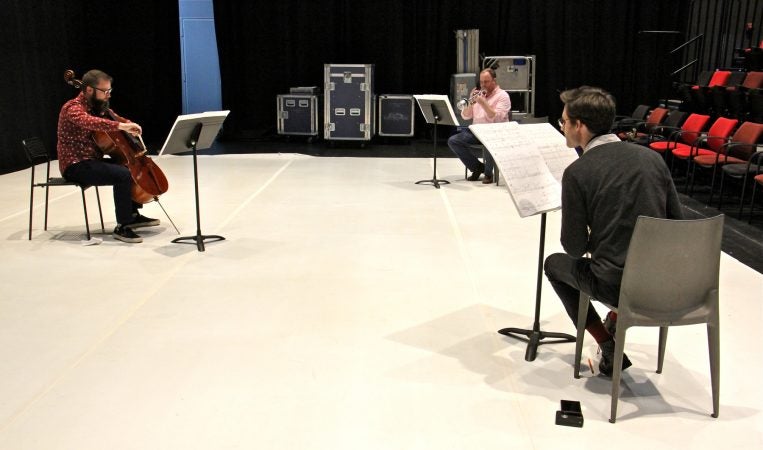
Erwachen (Awakening) for trumpet, cello, and soprano saxophone is rehearsed by (from left) Eric Coyne, Joe Drew, and Aaron Stewart. (Emma Lee/WHYY)
-
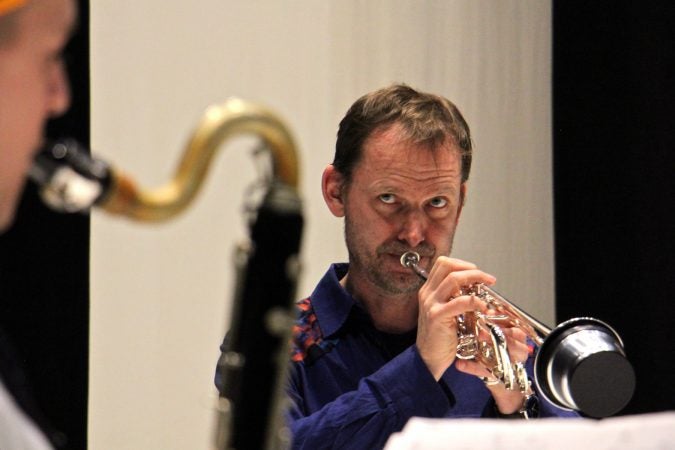
Marco Blaauw plays the trumpet and coaches the trio during a rehearsal for Schönheit (Beauty). (Emma Lee/WHYY)
-
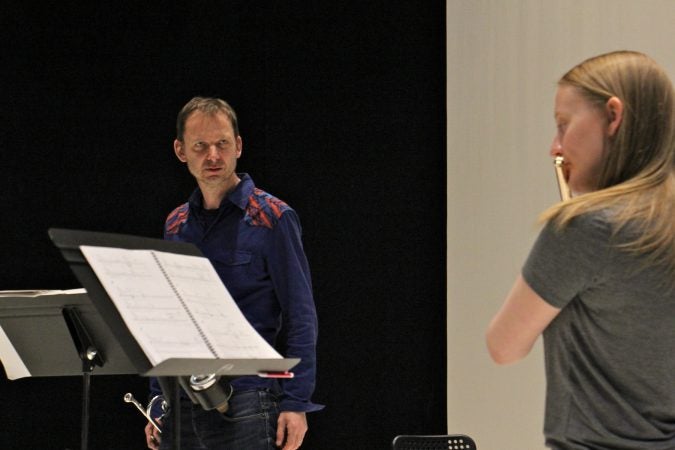
Marco Blaauw listens as Emma Resmini plays her part in Schönheit. (Emma Lee/WHYY)
-
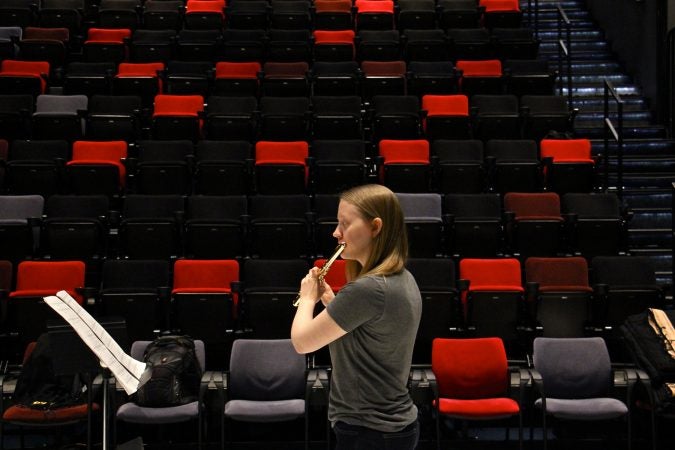
Emma Resmini plays the flute during a rehearsal on the Fringe Arts stage for Analog Arts' production of Klang by Karlheinz Stockhausen. (Emma Lee/WHYY
-
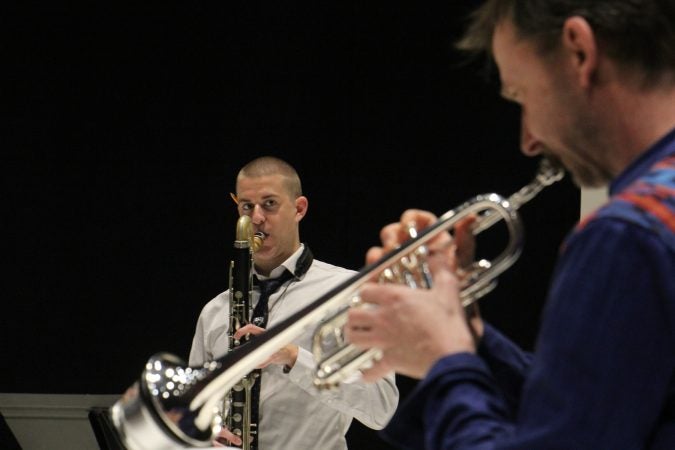
Bass clarinetist Sean Bailey keeps an eye on Marco Blaauw during a rehearsal for Karlheinz Stockhausen's cycle, Klang. (Emma Lee/WHYY)
-
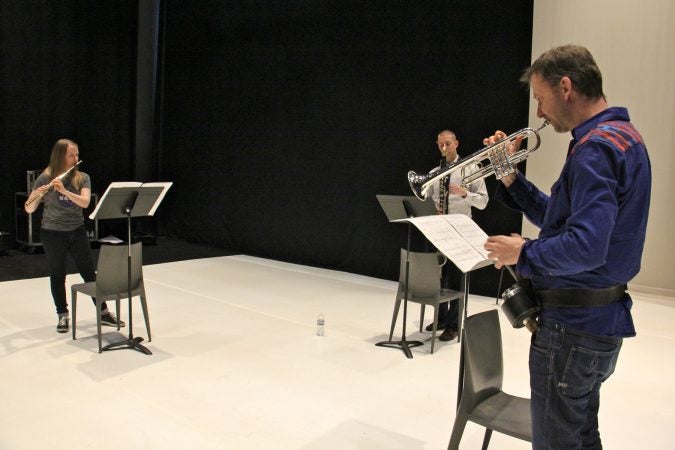
Performing Schönheit, (from left) Emma Resmini, flute, Sean Bailey, bass clarinet, and Marco Blaauw, trumpet, rehearse on the Fringe Arts stage. (Emma Lee/WHYY)
-
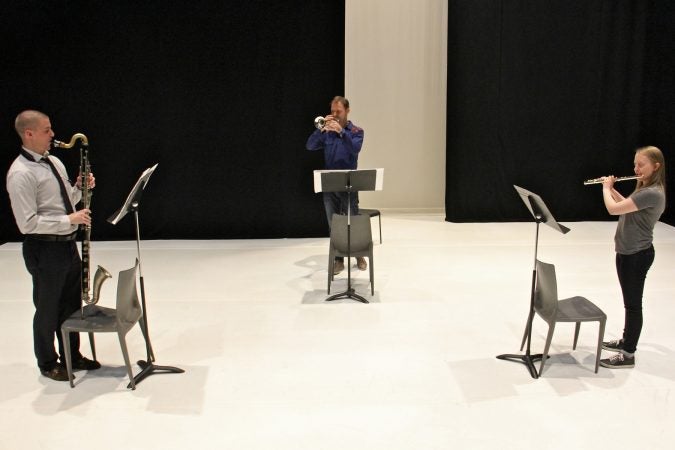
Performing Schönheit, (from left) Sean Bailey, bass clarinet, Marco Blaauw, trumpet, and Emma Resmini, flute, rehearse on the Fringe Arts stage. (Emma Lee/WHYY)
In the pantheon of modern classical music, Karlheinz Stockhausen looms large, with a career that spanned six decades and included orchestral and chamber works, electronic music and opera.
And many were large scale. At FringeArts this weekend, an intrepid group of musicians will mount the Philadelphia premiere of the composer’s final work, “Klang,” all 14 hours worth. Harpist Elizabeth Huston, who leads the project, said she’s drawn to big works that aren’t often performed in their entirety.
“Klang” is a cycle of chamber works, one representing each hour of the day. Stockhausen died in 2007 before completing the set, so the final work consists of 21 sections.
“He was obsessed by time and the concept of time … how do we perceive time, how do we live time?” said trumpeter Marco Blaauw, who worked for Stockhausen for many years. He’s a member of the ensemble Musik Fabrik, which has been coaching the Philly performers.
Stockhausen wrote “Klang” after completing works that reflected the seasons, the 12 months of the year, and the seven days of the week. When I spoke with him in 1982 for the documentary series Totally Wired, he was contemplating the next steps in the sequence.
“I want to concentrate on the day and then the hour and then on the minute and then on the second,” he said. “And, once I die, I’m sure I’ll discover that a second is an eternity, and that there’s a lot going on in a second. I mean, the quickness of a thought and the time unit of my alpha waves of my brain are far smaller than the second. To amplify this and to stretch it … because I think the miracles are in this microtime.”
Stockhausen had the reputation of being an intense personality, with strong opinions to go along with his big musical concepts. He related the scale of his work to the architects of Europe’s grand cathedrals.
“My concept of time has come back to a concept that was once the main concept of artists when they designed cathedrals,” he said. “Cologne cathedral was planned for being built over one or two centuries, and they couldn’t even finish it. They finished it in the 19th century. They dared to plan something that would take a lot of time.”
“He did have a huge ego,” said Chester County-based pianist Ron Thomas, who studied with Stockhausen when the composer was a visiting professor at the University of Pennsylvania in the 1960s. However, he recalled another side to the iconic artist. “He was very generous in sharing how he worked. He brought in his own compositions, and we analyzed them. It was artistic and academic at the same time.”
Those two aspects can be heard in Stockhausen’s music, said Blaauw. “He had a very strict systematic way of working, but, at the same time, he puts a lot of poetry into the music in the way he shapes the phrasing. It’s a romantic, 19th-century way of looking at music. The way he talked about it, it’s almost back to Brahms. It’s very contemporary serial music combined with a romantic heart.”
Another component makes Klang inviting to new audiences, according to Huston.
“It’s a very visual experience. There’s a piece for two harps where the players are supposed to be gesturing to each other. In another, the clarinetists spin around.
“All of the pieces have been assigned a color that you’re supposed to either project or that the performers are supposed to wear. I think this idea that music can be multidisciplinary, that it’s not just theater and dance that can have sets, is very compelling,” she said.”
Yet, the challenge of approaching 14 hours of music remains.
“We designed this event around the idea that sitting in a chair and listening to music for 14 hours is an impossibility,” Huston said.
To that end, in some sections, the audience will be encouraged to move about, even onto the stage, or out into a break room for refreshments and a chat with a Stockhausen scholar.
“And then, the second part, we are putting pieces of “Klang” that are inspired by each other in parallel rooms,” she said. “So you can listen to one and then move to the other and listen to the parallel themes.”
Karlheinz Stockhausen’s “Klang” will be presented Saturday and Sunday at FringeArts.
WHYY is your source for fact-based, in-depth journalism and information. As a nonprofit organization, we rely on financial support from readers like you. Please give today.




